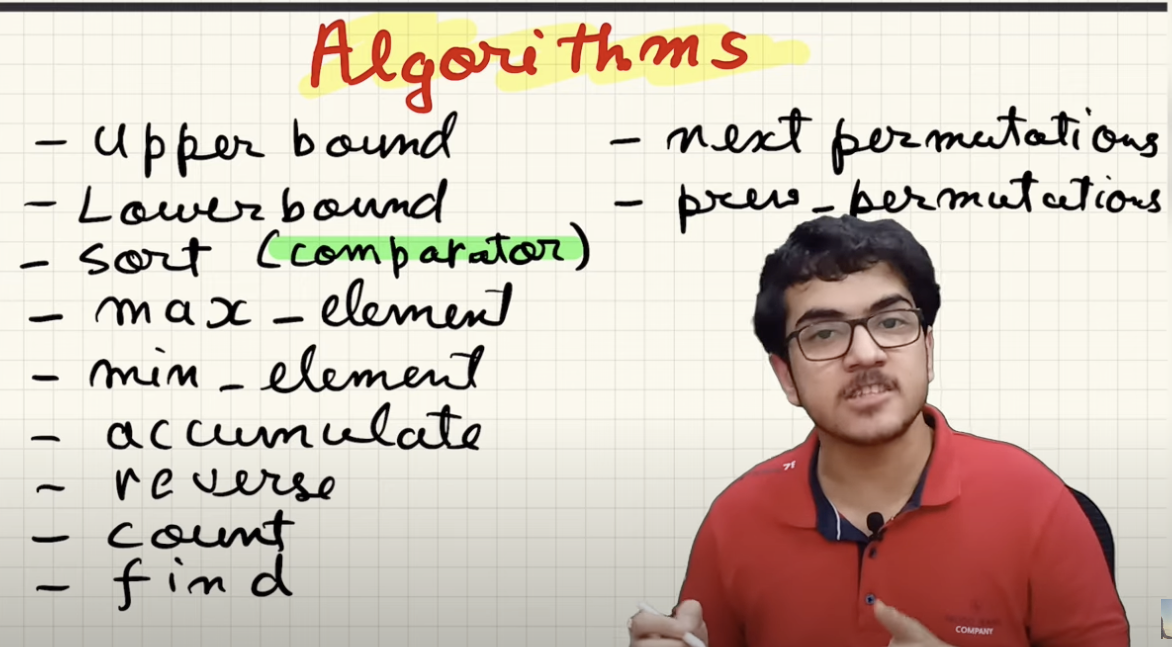tags:
- STL
- algorithms
- binary-search
- sorting
- hof
2. Algorithms #
Created Sun May 12, 2024 at 7:35 PM

Linear search #
find is a function (not method) that can be used on any container.
BUT, we’ll avoid giving this too much precedence since most container have a method named find (method, not function), that’s much faster. Less confusion.
vector<int> v;
auto it = find(v.begin(), v.end(), 20);
Binary search #
Reference: https://cplusplus.com/reference/algorithm/#:~:text=range (function template)-,binary search,-(operating%20on%20partitioned
Existence #
binary_search(startIt, endIt, key); // existence check
bool e = binary_search(v.begin(), v.end(), 20);
// e.g 10 10 10 20 20 20 30 30
// key=20 => true
// key=21 => false
Lower bound (left side = || >) #
// Lower bound means "left side" (<=)
lower_bound (startIt, endIt, key);
auto it = lower_bound(v.begin(), v.end(), 20); // v is a vector
// e.g 10 10 10 20 20 20 30 30, key=20
// Result is ..., 10, ^20
// Satellite data pair<int, T> is possible. But tweak needed
// lower_bound(v.begin(), v.end(), make_pair(20, string())); // for vector<pair<int, string>>;
Upper bound (right side >) #
// upper bound means "right side" (>)
upper_bound (startIt, endIt, key);
auto it = upper_bound(v.begin(), v.end(), 20); // v is a vector
// e.g 10 10 10 20 20 20 30 30, key=20
// Result is ..., 20, ^30, ...
// Satellite data pair<int, T> is possible. But tweak needed
// upper_bound(v.begin(), v.end(), make_pair(20, string())); // for vector<pair<int, string>>;
Range (range from left to right side) #
Get “equivalent” range.
// left side >=, right side >
auto it_pair = equal_range(startIt, endIt, key);
auto startIt = it_pair.first;
auto endIt = it_pair.second;
// e.g 10 10 10 20 20 20 30 30, key=20
// range is [20, 20, 20, 30]
Min and max #
Get value #
2-valued function.
min(a, b);
min(a, b, customFunctor);
int x = min(1, 2);
max (/* same as above */)
auto xPair = minmax (/* same as above */)
Get location #
min_element(startIt, endIt);
min_element(startIt, endIt, customFunctor);
max_element (/* same as above */)
auto itPair = minmax_element (/* same as above */)
// Satellite data - sorts based on int if element type is pair<int, T>
Sorting #
Reference: https://cplusplus.com/reference/algorithm/#:~:text=point (function template)-,sorting All are in-place ops.
sort (non stable) #
std::sort works for any container (except strict ADTs like stack, queue, or already sorted ones)
sort(startI, endI) // natural sort, i.e. increasing order, alphabetical order
sort(startI, endI, greater<int>()) // decreasing order.
// Remember: greater is a call here, min PriorityQueue declaration is not a call.
sort(starI, endI, [] -> bool (auto a, auto b){ return is_should_keep; }); // custom
// Satellite data - sorts based on int if element type is pair<int, T>
stable_sort #
stable_sort(startIt, endIt);
stable_sort(startIt, endIt, greater<int>()); // decreasing order
stable_sort(starI, endI, [] -> bool (auto a, auto b){ return is_should_keep; }); // custom
// Satellite data - sorts based on int if element type is pair<int, T>
Check if sorted #
is_sorted(startIt, endIt);
vector<int> v;
bool isSorted = is_sorted(v.begin(), v.end());
// is_sorted(v.begin(), v.end(), greater<int>()) to check if reversed in sorted order
// Satellite data - sorts based on int if element type is pair<int, T>
Comparison #
Equality #
Compare two ranges (of any data structure)
equal(startIt1, endIt1, startIt2, endIt2);
equal(startIt1, endIt1, startIt2, endIt2, customFunctor); // [](a, b){ return a==b; }
For comparing whole containers that are “stable”, just check ==.
So works for vector, unordered_set, unordered_map, queue, stack, deque.
Doesn’t work for priority_queue, multimap, multiset.
Alphabetic order #
lexicographic_compare(startIt1, endIt1, startIt2, endIt2);
lexicographic_compare(startIt1, endIt1, startIt2, endIt2, compareFunctor); // TBD
All, any, none #
all_of (startIt, endIt, customFunctor);
any_of (startIt, endIt, customFunctor); // !all_of(!item)
none_of(startIt, endIt, customFunctor);
Higher-order functions #
Can work on any data structure (except strict ADT like stack).
Map #
// HOFs - need decltype, back_inserter
// // map - transform()
decltype(v) output (v.size());
tranform(v.begin(), v.end(), output.begin(), [](){ return 1; }); // new array
tranform(v.begin(), v.end(), v.begin(), [](){ return 1; }); // in-place
Filter #
// // Filter - copy_if()
decltype(v) output;
copy_if(v.begin(), v.end(), back_inserter(output), [](){ return 1; }); // new array
// in-place - resize, distance
auto it = copy_if(v.begin(), v.end(), v.begin(), [](){ return 1; });
v.resize(distance(v.begin(), it));
Reduce #
// // Reduce - accumulate()
auto result = accumulate(v.begin(), v.end(), 0, [](auto accum, auto item){ return accum * item; });
Count #
count(v.begin(), v.end(), key); // uses operator ==
count_if(v.begin(), v.end(), customFunctor); // [](auto a){}
Sequence ops #
Reverse #
Its a function, no container level methods are present. In place operation.
void reverse(startIt, endIt);
vector<int> v;
reverse(v.begin(), v.end());
string s;
reverse(s.begin(), s.end());
Rotate #
Rotate by k to the left. (movement right to left). In place operation.
rotate(startIt, middleIt, endIt); // rotates such that middleIt, becomes the first element
rotate(startIt, startIt + k, endIt); // intuitive, rotate k to left.
rotate(startIt, endIt - k, endIt); // intuitive, rotate k to right.
vector<int> v;
auto newVecIt = rotate(v.begin(), v.begin()+2, v.end());
string s;
auto newStrIt = rotate(s.begin(), s.begin()+2, s.end());
Partition #
auto firstItemOfRightGroupIt
= partition(v.begin(), v.end(), customFunctor); // [](auto a) { return isOnLeft; }
partition(v.begin(), v.end(), [](auto i) { return i <= k; }); // parition w.r.t value k
stable_partition()// works the same but keeps stability (same values stay in order)
Merge #
merge(startIt1, endIt1, startIt2, endIt2, writerIt);
// for vector
decltype(v1) output (v1.size() + v2.size(), 0);
merge(v1.begin(), v1.end(), v2.begin(), v2.end(), output.begin());
Set operations #
General set operations - do not exist. ❌ STL has functions only for sorted sets. All 4 supported:
set_union(startIt1, endIt1, startIt2, endIt2, writerIt);
set_intersection (/* same as above */)
set_difference (/* same as above */)
set_symmetric_difference (/* same as above */);
includes(startIt1, endIt1, startIt2, endIt2); // works on all containers
Permutations #
In-place operation. O(n/2).
next_permutation(startIt, endIt);
next_permutation(startIt, endIt, compareFunctor); // [](auto a, b) { return is_should_swap; }
previous_permutation(startIt, endIt);
TBD
Misc #
__gcd(a, b)